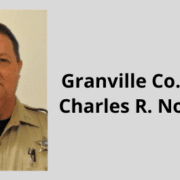Granville County Sheriff Warns Against COVID-19 Scams
100.1 FM ~ 1450 AM ~ WIZS, Your Community Voice ~ Click to LISTEN LOCAL
-Press Release, Granville County Government
Granville County Sheriff Charles Noblin, Jr. advises that scammers have been “pulling out all the stops” to capitalize on the COVID-19 pandemic, using illegal robocalls, phony websites, bogus emails and other forms of communication. In the Summer 2020 Newsletter of the North Carolina Sheriff’s Association, Sheriff Noblin offers a warning to be aware and to look to trusted sources of information to stay safe and avoid being a victim.
According to the North Carolina Department of Justice (NCDOJ), there have been reports of scammers knocking on doors trying to peddle fake cures and test kits, as well as cleaning supplies and personal protective equipment. At the same time, price gougers had been driving up prices on necessities like toilet paper, food products, gasoline, disinfectants and hand sanitizer.
The Coronavirus Aid, Relief and Economic Security (CARES) Act and the release of economic relief payments offer scammers yet another opportunity to trick citizens out of their money and personal information. Social Security beneficiaries have reported receiving calls from scammers claiming to be from the United States Treasury Department, the Social Security Administration or the Internal Revenue Service, who try to convince them to give out confidential information such as their bank account numbers, Social Security information or government benefits debit card number.
According to the Federal Trade Commission, there are ways for consumers to avoid falling victim to coronavirus-related scams:
- Do not respond to texts, emails or calls about checks from the government. The Internal Revenue Service will not contact you by telephone, email, text message or social media;
- Ignore online offers for vaccinations, since there are no products proven to prevent or cure the coronavirus at this time;
- Be wary of ads for test kits;
- Hang up on robocalls;
- Watch for emails claiming to be from the Centers for Disease Control or the World Health Organization, and report any concerns;
- Do your homework when making donations. Never make a contribution by cash, in gift cards or through wiring money.
To file a complaint with the North Carolina Department of Justice’s Consumer Protection Division, call 1-877-5-NO-SCAM.

